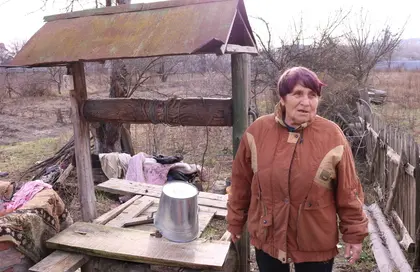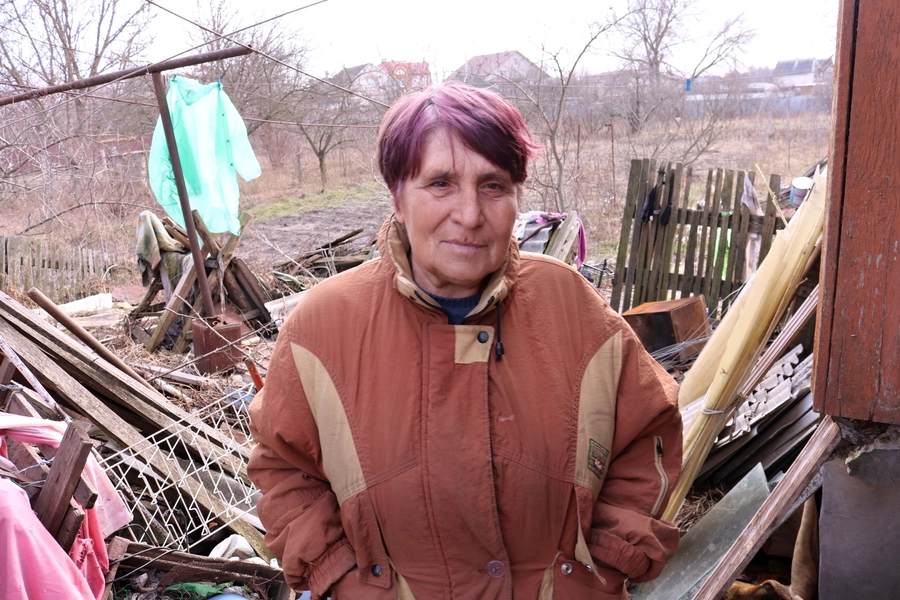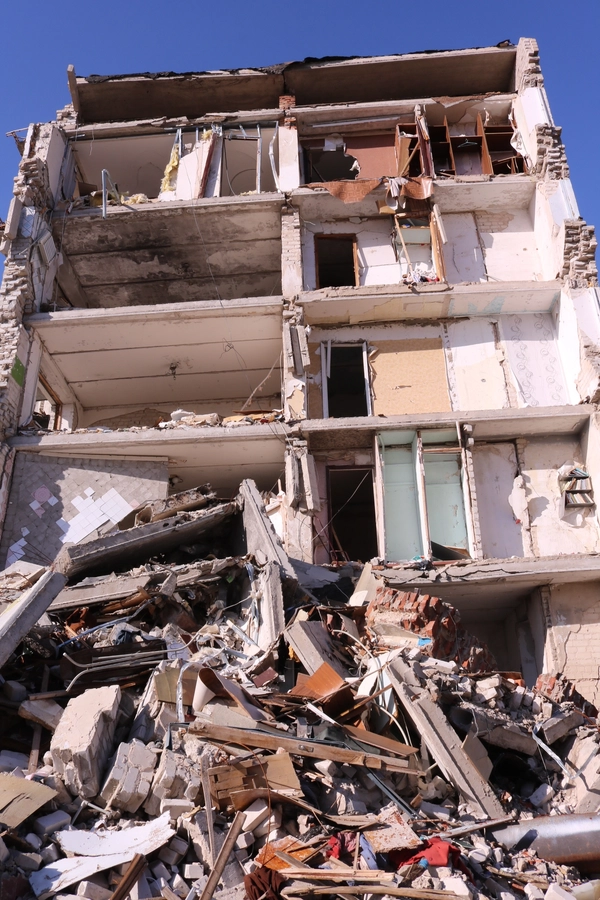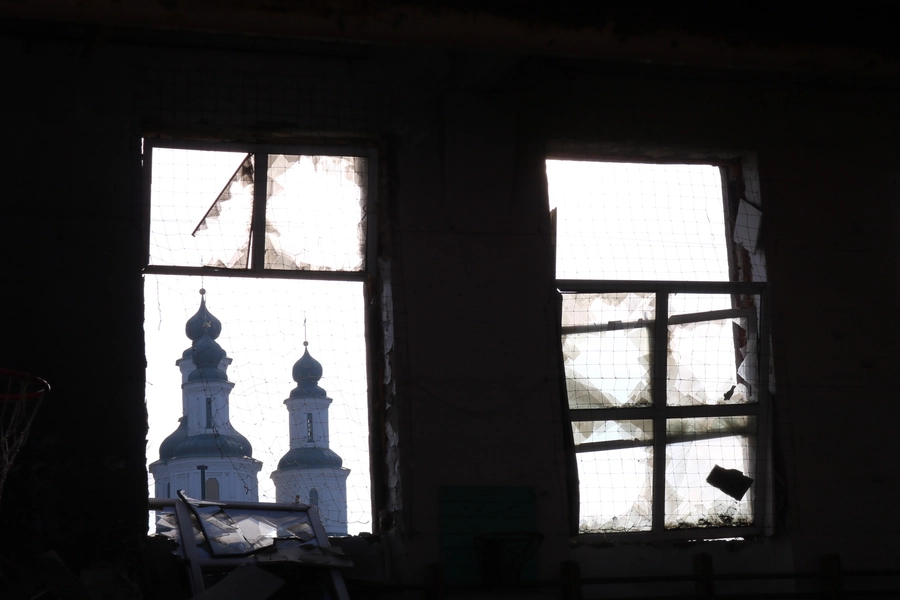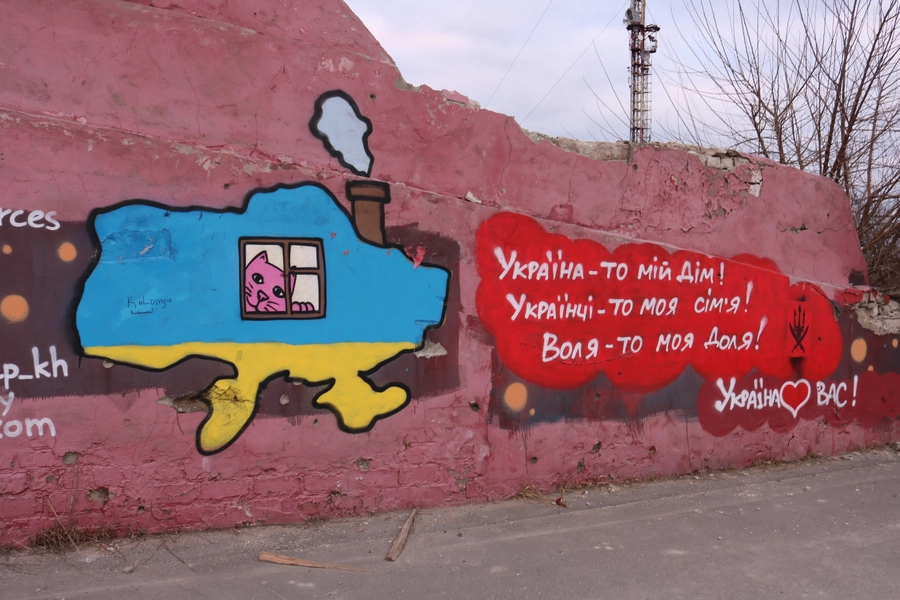Walking through the “minefield” of occupation
“As I watched the invaders hoisting the Russian flag on our city buildings, I was just crying, my heart was breaking. And those who supported them… I mean, how can someone just sell themselves this way to the occupiers? To my shocking discovery, some locals would shake and kiss their hands. Why? I just can’t wrap my head around it. I am Ukrainian, I was born here, and I won’t just leave and sell my values,” Liuba shares the pain she felt seeing Izium being captured.
JOIN US ON TELEGRAM
Follow our coverage of the war on the @Kyivpost_official.
Liuba saw no point in talking to the occupiers who initially seemed to be doing the right thing and explained her the reasons why as if reading from a textbook:
“I once asked one of them, ‘What exactly are you liberating us from?’ The response was ‘From the Nazis and Banderivtsi’. I asked if they saw any of those here? Like seriously. I have lived here for over 50 years and encountered no one like this.”
She even tried to appeal to the Russian conscience, but eventually, found it was non-existent:
“I would always tell them that I could rebuild the house, but they were shelling and destroying places where their great-grandparents used to live and were buried. And their response was always: ‘Dear lady, don’t you cry. Everything will be okay.’ They would say this but never cared if it was going to be that way. They just ruined everything, turned their back, and left.”
It was hard to witness injustice and looting during the occupation. Troops would say they were checking the houses looking for Ukrainian defenders or territorial defense but then they would take personal belongings in spite of claiming to be doing mopping-up operations. Locals were afraid to say anything because the aggressors were armed.
During this time people learned to live with the realities of life. Once Liuba was washing clothes outdoors with Tolia by her side. A rocket suddenly flew over their house so she grabbed her son and rushed to hide. It was targeting a neighboring street sometimes shells would land close by, less than 50 meters away. After one shelling she looked out of the window and saw something in the ground that wasn’t usually there. As she approached it, she realized it was a rocket sticking out of the ground. This was the sort of unimaginable event that she and so many Ukrainians now share every day.
One of the scariest things they encountered were the PFM-1 anti-personnel “butterfly’ mines that became scattered around the city. Checking and watching under their feet became an instinct for any careless victim.
Liuba used to invite neighbors to pick plums from her garden, but after a near miss once when she, by luck, avoided stepping on a mine by one of her trees, she warned everyone to be even more careful than ever and became reluctant to use the garden. As the war went on injuries from the mines became more and more frequent one of Liuba’s neighbors lost his leg while pasturing a goat.
Harvesting hope from the well of kindness
Even with the injustices imposed by the invaders allowed themselves, Liuba had to focus on the practical challenges of providing her son with food and remembers wondering how her mother had survived WW II but that she would have to find the answers herself:
“I asked my mom if she planted vegetables during the war. I couldn’t imagine that I would have to do it too. There are shellings around while me and my neighbors are busy taking care of the garden.”
She remembers how much humanitarian aid came to Izium after the liberation from all over - food, clothes, vegetables, and medications, but before the invasion, she never saw the need to store extra groceries at home:
“My mom always taught me to be more prepared for whatever happens. I would always think there was no reason to collect all these things, as there were so many stores nearby. And now, after everything we’ve been through, I realize how important it is to have some food in stock.”
She planted and harvested potatoes, carrots, tomatoes, onions, garlic, dill, and greens. There were two plum trees. The neighbors gave her some apples, so she could make some stewed fruit “compote” drink. She always tried to share what she could spare with those who had no gardens or any funds. Even though markets started reappearing in the middle of spring, how could one shop with no income or even breathe in the grip of occupation?
The mains water supply in Izium was frequently cut off by serious shelling, so people would queue by Liuba’s well, one of three in the district, from early morning. If a well became empty, it needed time to refill, so locals had to use another one. People used the well water to cook by their bomb shelters on hand-made stoves consisting of bricks and metals racks. People who came to the wells would share news or just support each other in their thirst for liberation:
“Everyone who was here tried to help me too. If people heard I was coughing, they would bring some medications to relieve my pain. Locals would always get some candy for my son to make our lives a little bit sweeter. This hardship united us, people started showing more kindness to one another, and act to help when seeing someone in distress.”
Fighting the battalion of traitors
Liuba would encounter people who supported the occupiers, and were happy with things as they were. She is not one to make a scene, but is also not one accept the things those people said:
“During the occupation, there some people were saying that Ukraine would never return, and it hurt me to hear such things. Even those words, let alone see it in reality. I just don’t understand how anyone can expect anything good from those who just looted your home?”
Some of Liuba’s relatives from Kharkiv met people who used to work in Bilhorodska and Kurska regions of Russia before the full-scale invasion who, on returning to Ukraine , became ardent supporters of the invasion. She could not understand this:
“I asked those fans of the occupiers, ‘Why didn't you stay to live in Russia for good? There were all the opportunities.’ And they answer, ‘There is nothing to do there!’. So my response was, ‘Then why do you support Russia so much? Go ahead. Leave. Why are you staying here? How dare you criticize and disrespect Ukraine?’”
A neighbor of Liuba’s sister neighbor was pro-Russian, until his sister’s apartment was shelled and he got to see how the things really were and changed his mind.
The well of hope fills up with liberation
“At first, we didn’t understand why it was so calm and quiet. There was no shelling or shooting. The occupiers just left at night. But even till now, there is always this chilling fear at the idea of them coming back. And everyone here is terrified even at the thought of it. But when I saw our Defenders in Izium, our Ukrainian boys, my heart was fluttering with joy,” she says as she remembers the moment of liberation.
Help and support flooded into Izium as it was freed, from all over Ukraine and the rest of the world. The process of reporting the damage to her home and getting assistance with repairs remains complicated - lots of queuing and filling in forms - but she will never give up. Liubov is Ukrainian for “love.” The love for her country and the gift of being free empowers her to keep pushing forward with dignity and determination, just like so many of her compatriots.
Liubov Volodymyrivna is so proud to see how people now respect and support Ukraine and its President in the country he visits. She feels real hope when she listens to President Zelensky’s speeches saying the one he gave at New Year brought tears to her eyes:
“Zelensky mentioned and supported every city which was liberated or encountered lots of hardships. He mentioned all the cities of Ukraine. Here and there, I notice people badmouthing the actions of our President. And those critics, why don’t they go for elections, become the President and show how to do things right? Some people like to say what needs to be changed, but fail to bring order even in their families, let alone in all of Ukraine. No other President did as much for the people as Zelensky.”
Even though the occupation scarred people deeply, they live in hope and act accordingly. Everyone something to support our Defenders and Ukraine. Liuba remains optimistic and full of hope too - just like the crystal-clear water in her well she feels that the well of hope will never go dry. For her and others who have suffered in Izium and elsewhere in Ukraine the continuing victories of Ukraine’s forces give a promise that soon all of Ukraine will celebrate the Victory:
“There were missiles and war jets flying over our roofs all the time. You could just sit and pray it wouldn't be your house. I hope that soon we will contemplate the peaceful sky above our heads. And we would go to sleep with hope for the next day and joy in our hearts. We stood and survived in this horror. And never complained. We are sure to win. No doubt about that in my heart,” explains Liuba.
Reports of Russian advances towards Kupiansk bring renewed fear to Izium’s citizens. But talking to people like Liubov Volodymyrivna, as you meet Ukraine’s defenders, as you hear more and more reports of towns and villages being liberated, you become irreversably convinced that the light in Ukrainian hearts knows no blackout. Even as it rains over Ukraine, we can still choose to look at the light of that Ukrainian invincible spirit and hope and see the iridescent nature of Ukraine’s fight for freedom.
The views expressed in this opinion article are the author’s and not necessarily those of Kyiv Post.
Olga German is a Ukrainian storyteller, dancer, journalist and documentalist.
You can also highlight the text and press Ctrl + Enter


